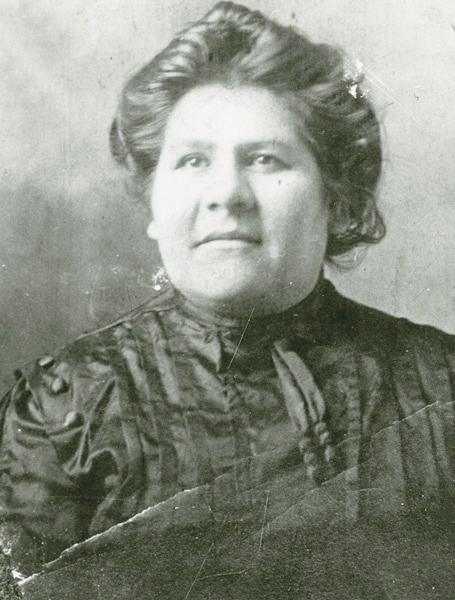Lettie Irons Connell, Standing Rock Sioux featured on Voices of the West

Josephine Waggoner
By Clara Caufield
Northern Cheyenne
Correspondent
A few weeks back Native Sun News featured a story about Voice of the West.net. That is a weekly internet radio show, produced in Tucson, AZ but aired to international audiences via the internet. The hour show is dedicated to sharing unique stories about the “wild west,” providing many different views about that that tumultuous time in American history.
On September 7, Lettie Irons Connell, a resident of Camp Verde, Ariz. and a Standing Rock Sioux descendent was the featured guest.
Lettie’s’ primary goal was to tell of her great-grandmother Josephine Waggoner. Over many decades Waggoner wrote of the Sioux and produced a massive tome of 699 pages “Witness: A Hunkpapha Historian’s Strong-Heart Song of the Lakotas.” After many harrowing years of seeking publication, both during her lifetime, where her unique information about the Sioux was high jacked by unorthodox scholars, Josephine’s descendants finally prevailed upon The University of Nebraska Press to print the entirety of Waggoner’s work in 2013.
That might be considered a definitive study of the Lakota and other Tribes associated with them. The information within “first-hand” sources as Waggoner lived with and personally knew most of the characters, including Sitting Bull. She interpreted and wrote letters for him when the legendary Chief resided at Standing Rock.
During the 1920’s and 30’s, Josephine Waggoner (1871-1943), a Lakota woman who had been educated at Hampton Normal Agricultural Institute in Virginia, grew increasingly concerned that the history and culture of her people were being lost as elders died without passing on their knowledge. A skilled writer, Waggoner set out to record the lifeways of her people and correct much of the misinformation about them spread by white writers, journalists and scholars of the day. To accomplish this task, she traveled to several Lakota and Lakota reservations to interview chiefs, elders, traditional tribal historians, and other tribal members, including women.
The first of Waggoner’s two manuscripts includes extraordinary firsthand and as-told-to historical stories by tribal members, such as accounts of life in the Powder River camps and at the agencies in the 1870’s, the experiences of a mixed-blood Hunkpapha girl at the first -off-reservation boarding school, and descriptions of traditional believes.
The second manuscript consists of Waggoner’s sixty biographies of Lakota and Dakota chiefs and headmen based on eyewitness accounts and interviews with the men themselves. The book is replete with historical photographs of these leaders.
While Lettie did not have the opportunity to know her great-grandmother personally, family recollections about this amazing woman are voluminous. For example, Lettie shared that her great-great-grandmother and Josephine lived in a cabin right next to Sitting Bull at Standing Rock for some time. Sitting Bull also had a small cabin and a teepee which separated to two log structures. “He was a quiet, mild-mannered man,” Grandma said, “making people feel comfortable. At that time, he had been traveling all over with ‘wild west’ shows, making money and getting even more famous. But, according to Grandma, when he realized his people were starving due to lack of adequate rations, he quit and stayed home. Many of the letters that Waggoner composed for Sitting Bill were appeals for more food for his people and other followers.”
It was partially during this time that Waggoner became personally acquainted with many Lakota leaders. Sitting Bull had a lot of visitors seeking his counsel.
Although Lettie tried to keep the focus one her great-grandmother, the hosts managed to pry a little information about her as well. Indeed, Connell has led a remarkable life: at a young age, in the 1970’s, she became a law and order supervisor in Los Angeles, a rare accomplishment during the “wild” days of demonstrators and protesters, including the American Indian Movement.
Most of her career has been as a Veterans Service Officer, certified by the Veteran’s Administration to assist Vets in getting their rightfully owed service-connected benefits. Since she is located in the southwest, many of her clients have been natives from that area. She was recently acknowledged by the National American Legion Women’s Auxiliary for her outstanding service.
Lettie also mentioned her sister Victoria, who is married into the Ojibway Tribe, Minnesota, and a life-long educator whose children have followed in those footsteps. For years, Lettie and Victoria coordinated to raise funds and organize trips for native students to Washington, D.C. touring the Smithsonian and Arlington Cometary. In addition, they organized cultural exchanges for young people between the Southwest and Great Lakes area.
In case you missed it, or are interested in hearing more, simply go to voicesofthewest.net. All the interviews are archived, which would give you an opportunity to hear exactly as Lettie said it on the show.
In addition, if you are an aficionado of Lakota history, check out WITNESS: A Hunkpapha Historian’s Strong-Heart Song of the Lakota. Raymond DeMallie, Chancellors’ Professor of Anthropology and American Indian Studies at Indian University wrote about the book. “Josephine Waggoner’s writings offer a unique perspective on the Lakota. Witness will become a widely referenced primary source. Emily Levine (the final editor) has meticulously examined all known collections of Waggoner’s manuscripts, sometimes comparing handwritten drafts with multiple type copes to preserve information in full. Levine’s extensive notes are well chosen and informative. Witness will interest both specialist and popular audiences.”
(Contact Clara Caufield at acheyennevoice2@gmail.com)
The post Lettie Irons Connell, Standing Rock Sioux featured on Voices of the West first appeared on Native Sun News Today.
Tags: Top News
